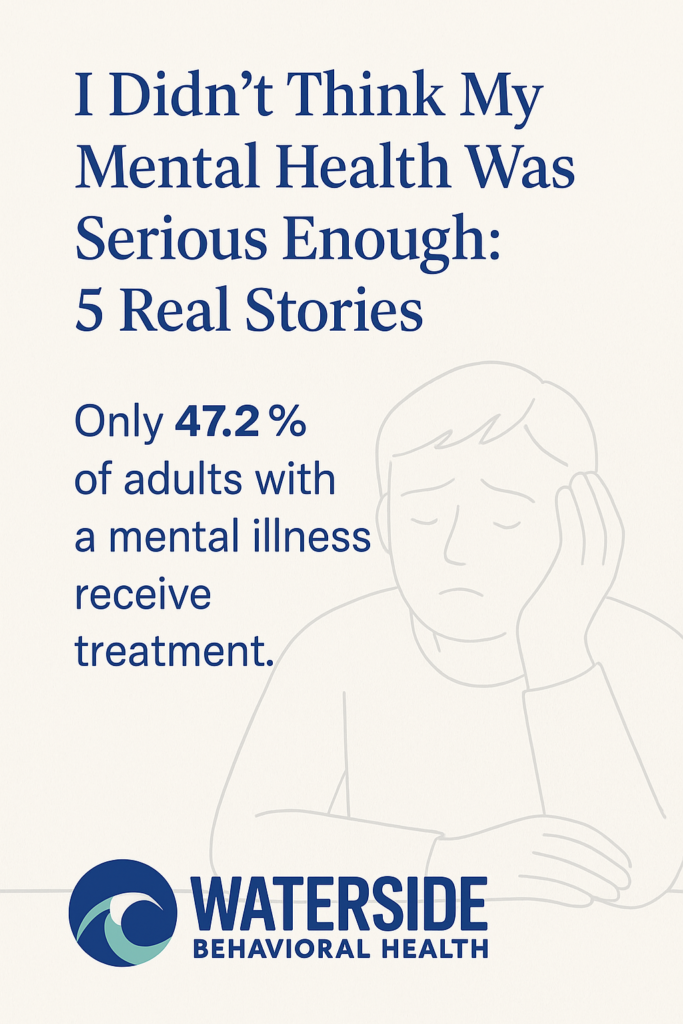Some days, I didn’t want to die. I just didn’t want to keep going like this.
I wasn’t in a dramatic spiral—I was in a quiet one. And for a long time, I thought that didn’t count.
When we picture someone “needing mental health treatment,” we often imagine crisis. We imagine ER visits, suicide notes, panic that won’t stop. But for many of us, what we feel is not quite right. It’s not a red alert. It’s a long, gray fog. And that’s harder to explain.
Here are five stories from people who thought their mental health didn’t “qualify” for treatment—and what helped them see it differently.
1. “I was the strong one. Until I couldn’t keep carrying it all.”
“I’d held everyone else up for so long—at work, in my family, even in my friend group. I was the advice-giver. The calm one. The one who showed up. But inside, I was eroding. I didn’t sleep. I couldn’t relax. I snapped at my partner over nothing. Still, I thought, ‘I’m just tired. I just need a weekend.’
Then one night, I sat in my car after work and couldn’t move. Couldn’t cry. Couldn’t go inside. That’s when it hit me—I wasn’t fine. I wasn’t even close.”
Mental health treatment isn’t just for falling apart. It’s for holding too much for too long. You don’t have to justify the weight you’re carrying. If it’s heavy, it’s heavy.
2. “I had a good life. So why did I feel like disappearing?”
“Objectively, things were great. I had a job I liked, a partner who loved me, a decent routine. But I’d fantasize about getting in my car and driving until everything disappeared. Not because I wanted to die—I just didn’t want to feel like this anymore.
I kept telling myself: You’re lucky. Other people have real problems. But the guilt didn’t fix anything. It just made me hide more.”
You don’t have to prove your suffering. You don’t need a tragedy to make your pain valid. If you’re struggling to feel like yourself, that matters.
3. “My panic attacks weren’t ‘bad enough’—until they took over everything.”
“I’d always been an anxious person, but I managed. Then I started having panic attacks in traffic. So I stopped taking the highway. Then they happened in the grocery store. I started doing Instacart. Then I skipped my friend’s wedding because I was afraid of having one there.
Still, I told myself, ‘It’s not serious. I’m just anxious.’ But I was changing my entire life around fear.”
Anxiety doesn’t have to look like chaos. It can look like shrinking. Treatment can help you stop living smaller and start feeling safe again.
4. “I thought being tired all the time was just adulthood.”
“I kept saying I was just ‘burned out.’ I thought that’s what adulthood was—exhausted all the time, numb at night, distracted during conversations. I wasn’t crying every day. I wasn’t missing work. I didn’t think it counted.
But I hadn’t felt joy in years. I hadn’t laughed from my gut. I hadn’t felt deeply present with anyone.”
Treatment helped me realize that I didn’t have to white-knuckle my way through life. I could rest. I could heal. I could feel again.
5. “I didn’t want to die. But I didn’t know how to keep living like this.”
“I had a whole folder in my phone of reasons to stay alive. It helped me for a while. But eventually, the weight of every day started to outmatch the list.
I wasn’t actively suicidal. I was just exhausted by being. I didn’t tell anyone because I didn’t want to scare them. And part of me felt guilty—like if I wasn’t in immediate danger, I should just keep going.
Therapy gave me a place to be honest without needing to ‘prove’ how bad it was. It became the one place I didn’t have to pretend.”
Sometimes, the most powerful thing we can say is: I don’t want to die—but I need something to change. That is enough.
What If You Deserve Help Before It Gets Worse?
You don’t have to wait until you’re in crisis.
You don’t have to fall apart in public to ask for support.
You don’t need a diagnosis to want to feel better.
Mental health treatment is not just for the worst-case scenario. It’s for the slow fades. The quiet battles. The high-functioning breakdowns. It’s for anyone who’s tired of surviving.
At Waterside Behavioral Health, we meet you where you are. Whether you’re barely hanging on or just numb to everything, we’ll help you explore what healing might look like at your pace, in your voice.
📞 Want to talk it through with someone who gets it? Call us at (774) 619-7750 or learn more about our mental health treatment programs in Massachusetts.
You don’t have to carry it alone.
FAQ: Mental Health Treatment When You’re Not in Crisis
Do I need a diagnosis to get mental health treatment?
No. Many people start therapy or treatment without a formal diagnosis. If something feels off—or if life feels harder than it should—you’re allowed to seek help.
What if I don’t feel “sick enough” to deserve support?
This is one of the most common barriers people face. The truth is: your pain doesn’t need to be dramatic to be real. Emotional suffering is valid even if you’re still going to work, showing up for others, or “functioning.”
Will people think I’m overreacting?
It’s easy to internalize that fear—but anyone who has been in your shoes knows the courage it takes to say, “I need help.” Seeking support is never overreacting. It’s responding to yourself with care.
Can I start with something small—like a conversation?
Absolutely. You don’t have to commit to a full program to take the first step. At Waterside, we’ll walk you through your options gently, without pressure. A single conversation can be a turning point.
What kind of treatment does Waterside offer?
We provide individual therapy, group counseling, and structured programs like intensive outpatient (IOP). Every plan is customized to your needs. You don’t have to figure it all out alone—we’ll do it together.





